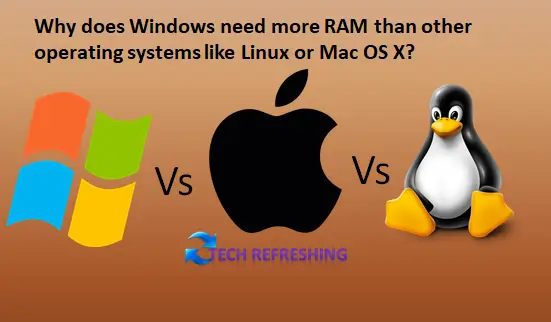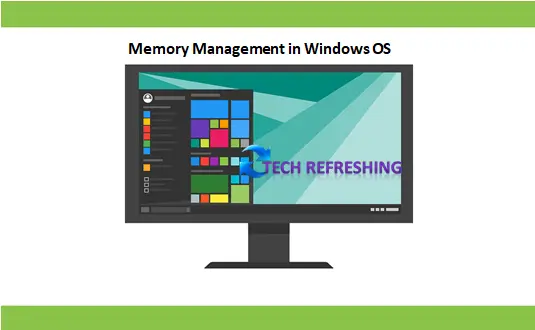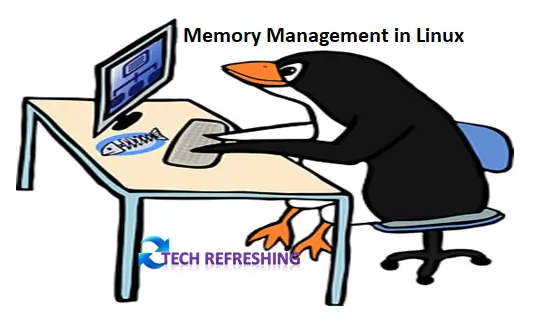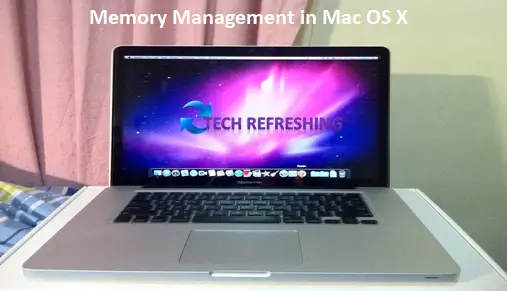
With the continuous advancement of technology, operating systems are becoming increasingly sophisticated and intricate. The amount of RAM (Random Access Memory) that an operating system demands to operate effectively is a crucial determinant of its performance. Windows, Linux and Mac OS X are some of the widely used operating systems in current times, but Windows is frequently deemed to necessitate more RAM compared to its competitors. Hence, this brings up the question of what factors lead to this requirement and why Windows necessitates more RAM than other operating systems.
Acquiring knowledge about why Windows demands more RAM than other operating systems can assist users in making well-informed decisions while selecting an operating system. Such an understanding can enable users to choose an operating system that aligns with their requirements and hardware specifications. Moreover, comprehending how diverse operating systems handle memory can assist users in optimizing their systems for enhanced performance, minimized crashes and heightened stability.
Background
Brief History of Windows, Linux, and Mac OS X
The world’s most prevalent operating systems include Windows, Linux and Mac OS X. Windows, developed by Microsoft, made its debut in 1985 and has undergone multiple enhancements since then. Conversely, Linux is an open-source operating system that Linus Torvalds initially released in 1991. Over time, it has evolved into one of the preferred operating systems used by developers and technology enthusiasts. Apple’s Mac OS X, which hit the market in 2001, is admired for its elegant design and user-friendly interface.
Explanation of the Differences in the Operating Systems
The architectural discrepancies are a primary distinguishing feature between these operating systems. Windows is a closed-source operating system that is intended to function on various hardware configurations. This attribute makes it more complex for Microsoft to tailor Windows for specific hardware setups, thereby resulting in a greater need for RAM.
Conversely, Linux is an open-source operating system that is exceedingly adaptable, making it easier for developers to optimize the system for specific hardware configurations. This usually leads to superior performance and less requirement for RAM. Mac OS X, while also a closed-source operating system, is exclusively designed to operate on Apple hardware. This allows Apple to customize the operating system explicitly for their hardware, leading to better performance and lower demand for RAM.
An additional distinction among these operating systems is their memory management methodology. Windows employs a paging system, which necessitates moving data between the hard drive and RAM when required. Unfortunately, this technique can lead to fragmentation and memory leaks, resulting in escalated RAM requirements. Conversely, Linux utilizes a swap space system, enabling it to manage memory more efficiently. Mac OS X employs a hybrid approach, combining the most effective aspects of both paging and swapping systems to optimize memory usage.
Overall, the differences in architecture and memory management between these operating systems contribute to variations in the amount of RAM required to run effectively.
Memory Management in Windows

How Windows Handles Memory
Windows is categorized as a demand-paged operating system, implying that it loads data from the hard drive into RAM only when necessary. This permits Windows to manage memory with enhanced efficiency. However, this also translates to Windows demanding more RAM to function optimally. In allocating memory to processes, Windows prioritizes higher priority processes by allocating them more memory than lower priority processes. Furthermore, Windows uses memory mapping to enable applications to access shared memory.
Memory Leaks and Fragmentation in Windows
Windows memory management is confronted with significant problems such as memory leaks and fragmentation. A memory leak transpires when an application assigns memory but fails to relinquish it when it is no longer required. This gradual loss of available memory can lead to crashes or system instability. Fragmentation ensues when the memory is not allocated in contiguous blocks, thereby rendering it difficult for Windows to assign memory effectively. This issue can cause escalated demand for RAM, slower performance, and more crashes.
Virtual memory in Windows
To mitigate issues with limited physical RAM, Windows uses virtual memory. Virtual memory allows Windows to use hard drive space as an extension of RAM, allowing applications to access more memory than is physically available. When an application needs more memory than is available, Windows moves some of the least recently used data from RAM to the hard drive, freeing up space in RAM. This process is known as paging. However, relying too heavily on virtual memory can lead to slower performance and increased wear and tear on the hard drive.
Windows’ memory management system is intended to be efficient. However, it can result in amplified RAM requirements due to its vulnerability to memory leaks, fragmentation and dependence on virtual memory.
Memory Management in Linux

How Linux Handles Memory
Linux uses a swap space system for memory management. When an application needs more memory than is available, Linux moves some of the least recently used data from RAM to a designated area on the hard drive called the swap space. This frees up space in RAM for the application to use. Additionally, Linux uses a process called overcommitment, which allows it to allocate more memory than is physically available. Linux assumes that not all applications will use all of the memory they request, so it overcommits the memory to maximize efficiency.
The Advantages of Linux’s Memory Management System
Linux’s memory management system boasts several benefits over other operating systems. By utilizing a swap space system, Linux can manage memory with enhanced efficiency and avert memory fragmentation. Linux’s overcommitment mechanism enables it to allocate more memory than what is physically present, leading to better application performance. Moreover, Linux provides robust tools for monitoring memory usage, simplifying the process of detecting and resolving memory management problems.
The drawbacks of Linux’s Memory Management System
Although Linux’s memory management system has several advantages, it also has some drawbacks. Managing Linux’s memory can be more complex than other operating systems since it allows overcommitment, which can result in system crashes or instability if more memory is allocated than available. Moreover, if the system relies too much on virtual memory due to the swap space system, it can result in slower performance. Finally, because Linux is highly customizable, it can be challenging for users to optimize the system for their specific hardware setup.
Memory Management in Mac OS X

How Mac OS X Handles Memory
Mac OS X’s memory management system combines demand paging and pre-fetching. Similar to Windows, Mac OS X is a demand-paged operating system that loads data from the hard drive into RAM only when it is needed. However, Mac OS X also employs pre-fetching, which loads data into RAM in advance in anticipation of it being required. This enables Mac OS X to manage memory more efficiently and enhance performance.
The advantages of Mac OS X’s memory management system
The memory management mechanism in Mac OS X has a number of benefits over other operating systems. It can manage memory more effectively and boost performance since it combines pre-fetching and demand paging. Moreover, Mac OS X employs a technique known as memory compression that shrinks data in RAM to make room for other programmes. This enables Mac OS X to utilise free memory more effectively and rely less on virtual memory.
The drawbacks of Mac OS X’s memory management system
Mac OS X’s memory management mechanism has a drawback that makes it more challenging to utilize than other operating systems. The employment of pre-fetching and memory compression methods in Mac OS X can lead to unforeseen memory usage, which poses difficulties for users in detecting and rectifying memory-related problems. Furthermore, if the system substantially relies on the swap space, Mac OS X’s reliance on virtual memory may result in worse performance.
Mac OS X’s memory management system is intended to enhance performance and efficiency, although it can be more complex to control than other operating systems. By implementing pre-fetching, memory compression and demand paging, Mac OS X can efficiently manage memory and decrease the dependence on virtual memory. Nevertheless, if not managed properly, this can lead to erratic memory usage and slower performance.
Factors Affecting Memory Usage

The Number of Applications Running
The quantity of applications operating on the system is a crucial element that determines memory usage. Each application necessitates a specific amount of memory to run, and if an excessive number of applications run simultaneously, the system may exhaust available memory. This can lead to slower performance, crashes, or other memory management issues. To optimize memory usage and ensure peak performance, it is crucial to regulate the number of applications running on the system.
The Type of Applications Running
The memory demands of various applications vary considerably. Applications that manipulate large amounts of data, like video editing software, necessitate more memory than straightforward text editors. Moreover, background-running applications, such as antivirus software, require memory resources as well. Hence, it is critical to consider the memory requirements of each application while choosing software and regulating the number of applications operating on the system.
The Hardware Specifications of the System
The system’s hardware specifications also impact memory usage significantly. A system with more RAM can accommodate more applications and data processing tasks, resulting in better performance. Furthermore, faster processors and solid-state drives can help reduce dependence on virtual memory and improve the overall system performance. Considering the hardware specifications is essential while optimizing memory usage and selecting software.
Overall, several factors can affect memory usage, including the number and type of applications running and the hardware specifications of the system. It is essential to consider these factors when optimizing memory usage and selecting software to ensure optimal system performance.
Conclusion
In this post, we compared how the operating systems Windows, Linux and Mac OS X manage memory. We evaluated the benefits and disadvantages of each system’s approach to managing memory. Also, we examined the system’s hardware characteristics as well as the quantity and type of running applications to see how they affect memory utilisation.
Managing memory is an essential factor that impacts the overall performance of an operating system. Although memory management approaches vary between operating systems, there are trade-offs to consider. For instance, Windows is known for its memory management system that requires more RAM, whereas Linux is often perceived as more efficient in memory management. Mac OS X utilizes demand paging and pre-fetching to manage memory more effectively.







Not only tech we have to share all typs of variant so that all will like n share… Bt all the mattars are gud for studies.
Thank u for information sir